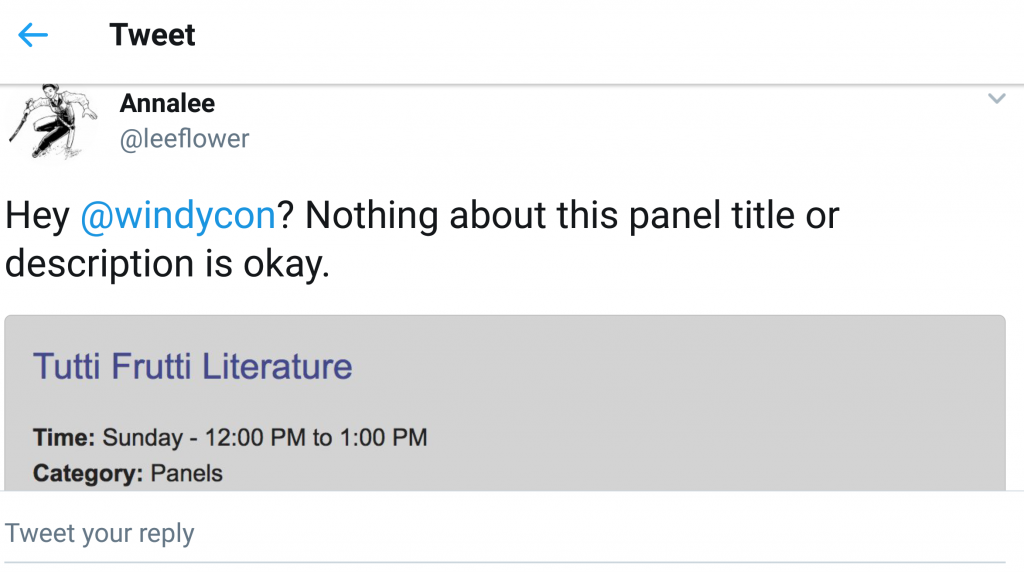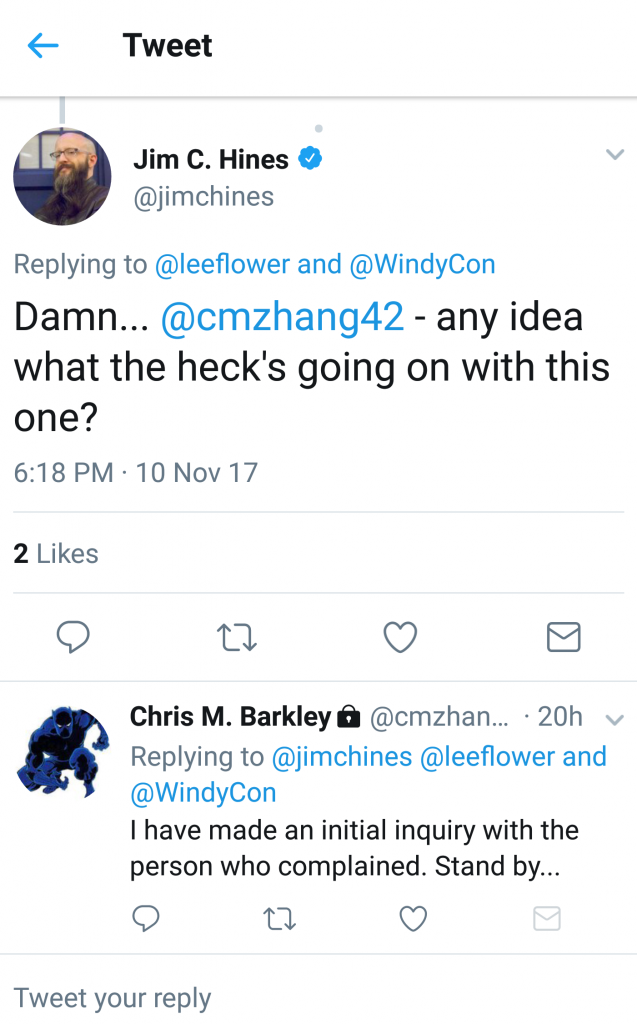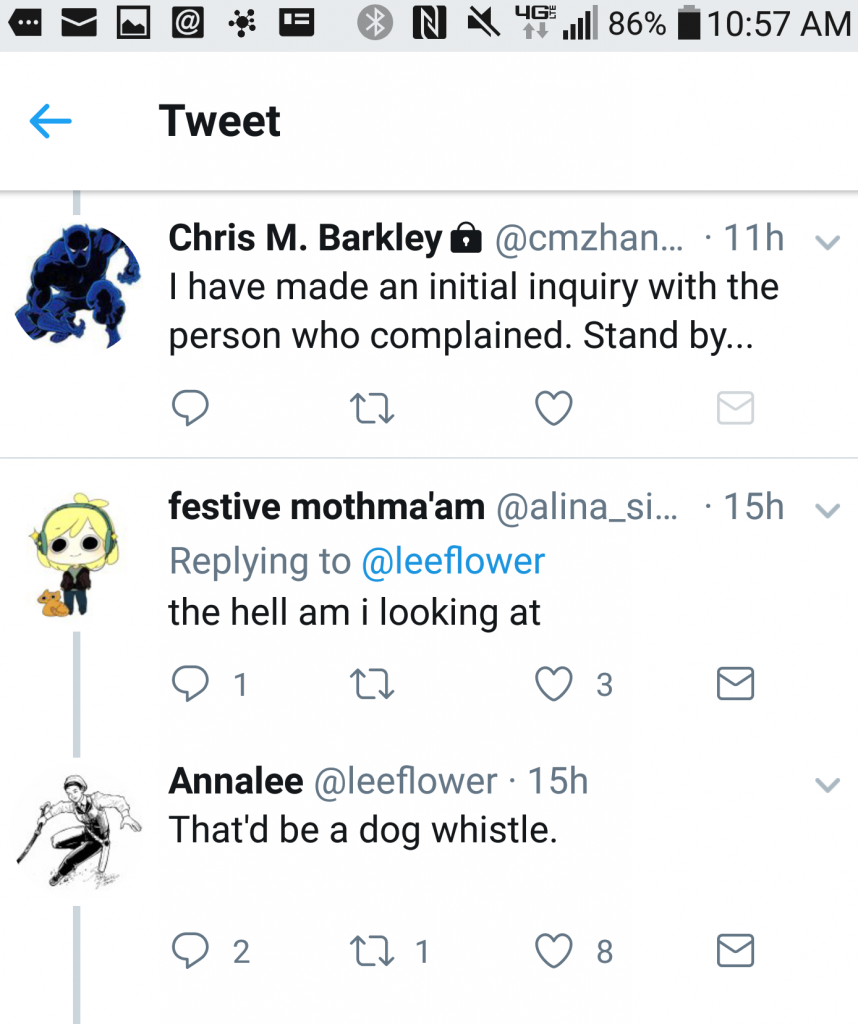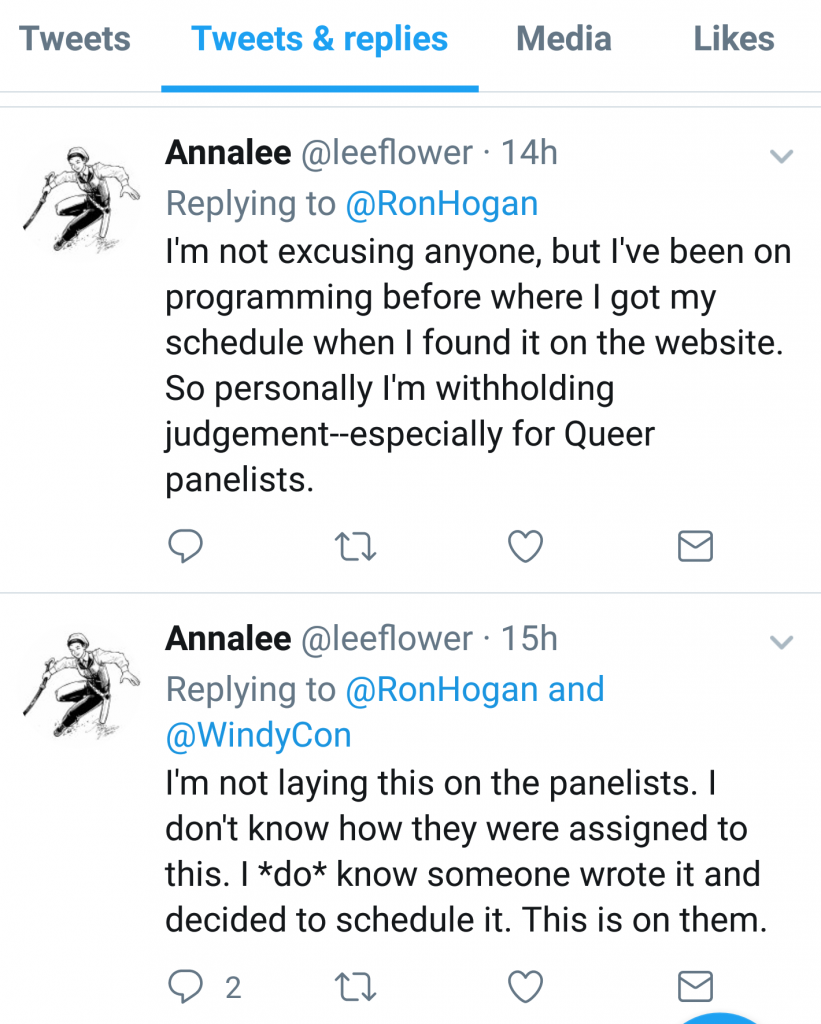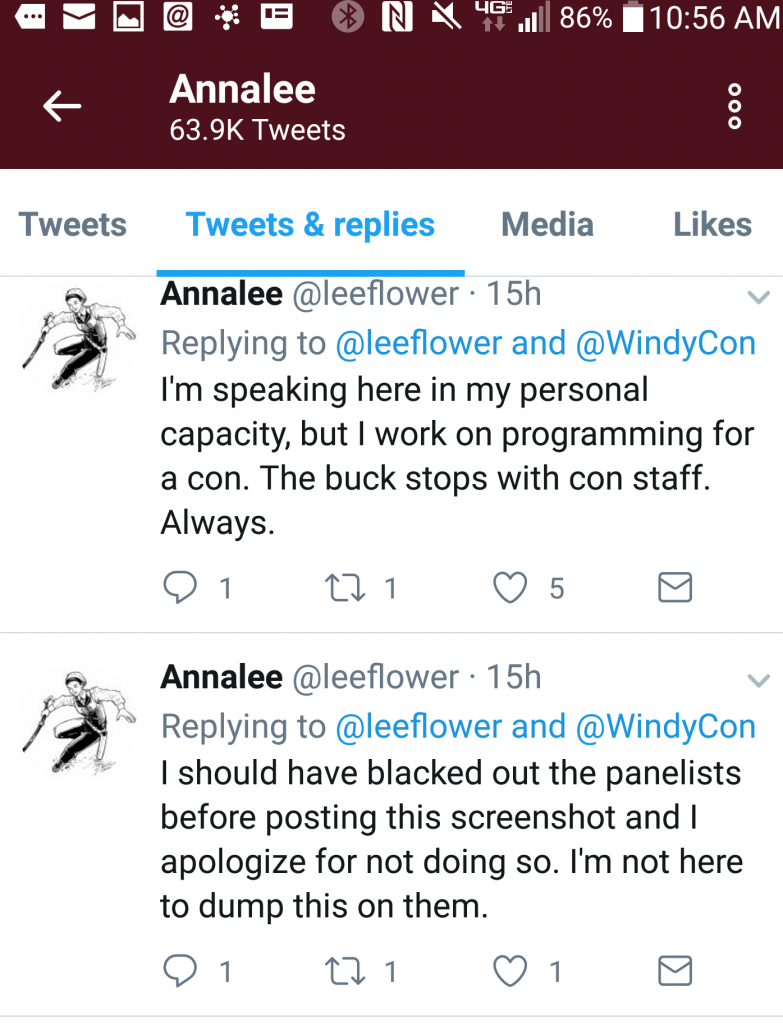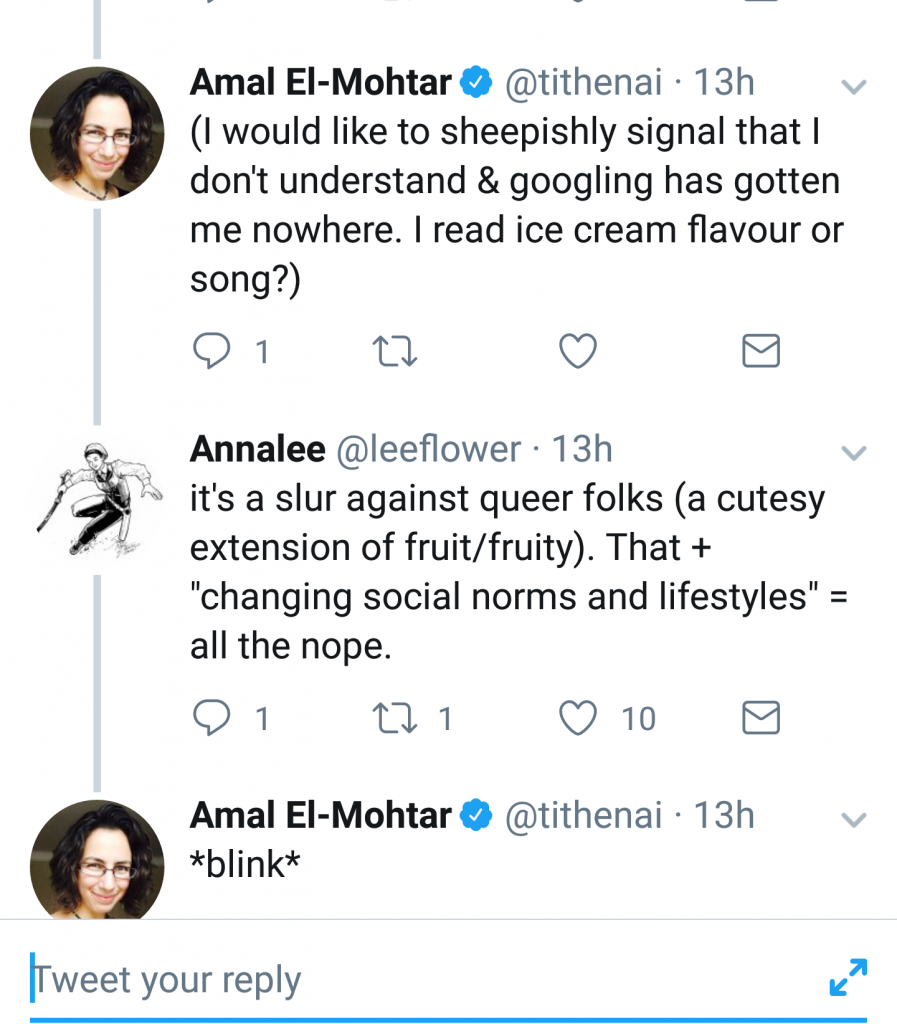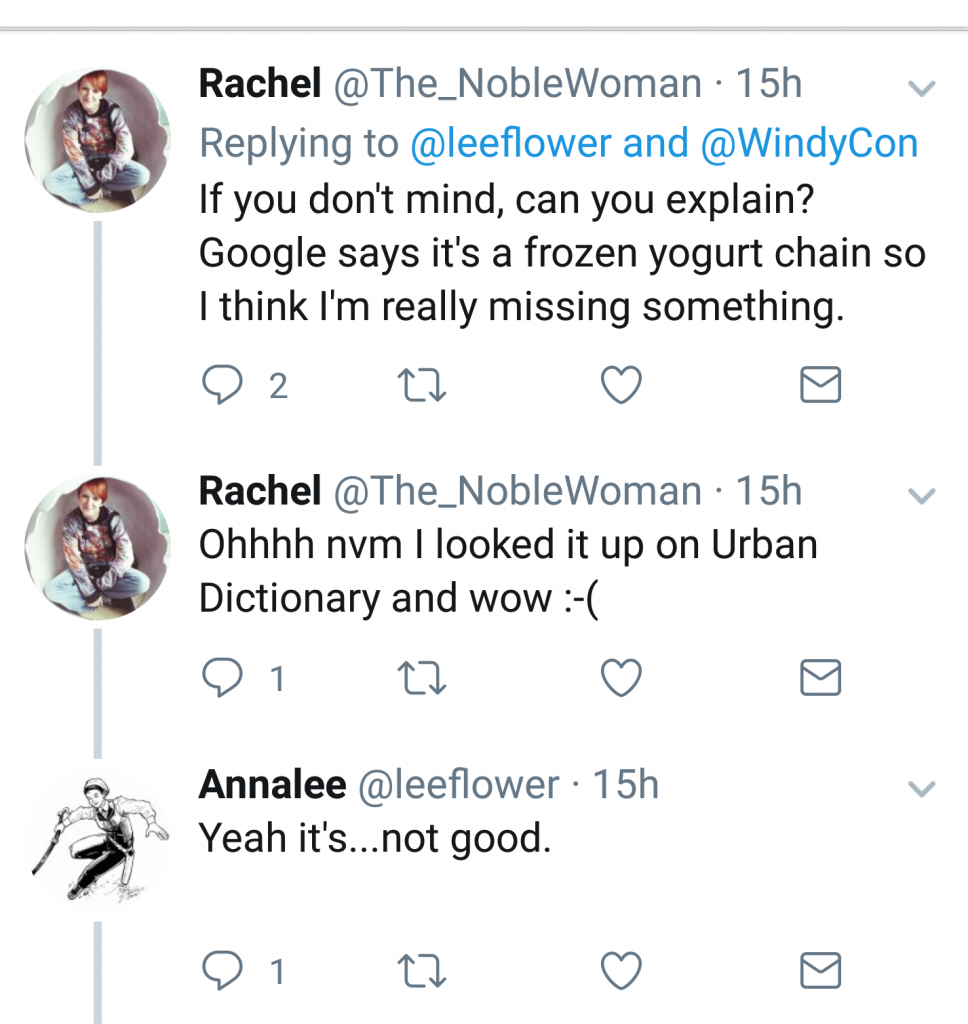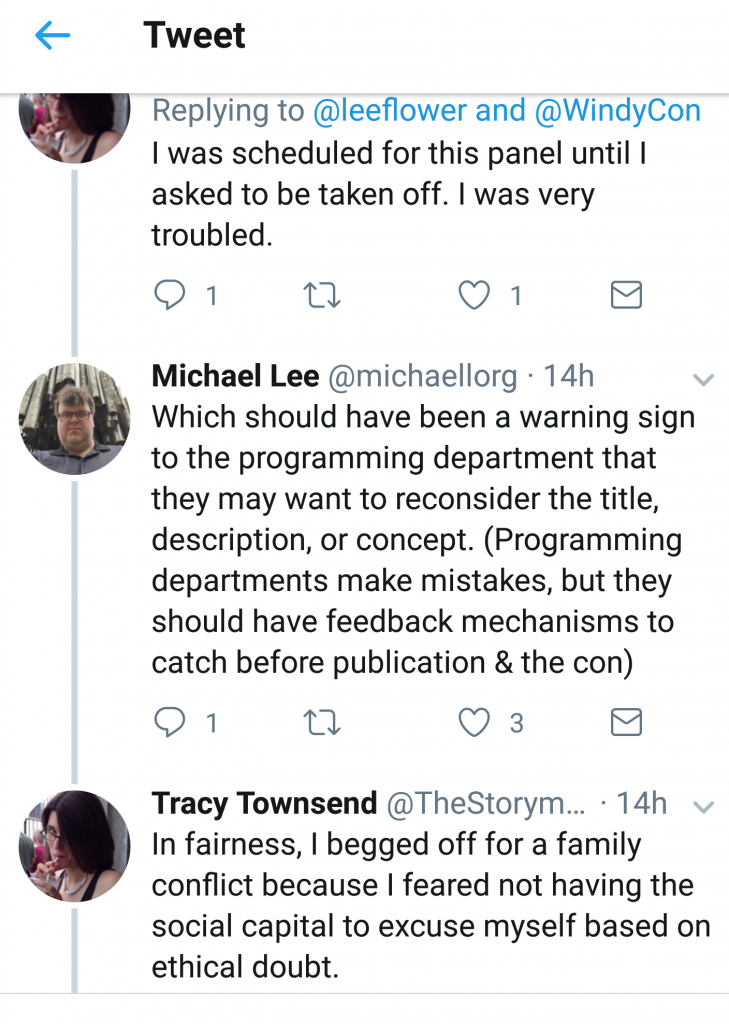[Reblogged from the author’s site by permission.]
By Mari Brighe: As someone who writes about LGBTQ issues and feminism professionally, I’m fairly used to finding myself embroiled in controversy, whether in digital spaces or otherwise. Something I never expected, however, was to find myself in the center of a imbroglio as bizarre as the happenings at Windycon this past weekend. A whole lot of unclear wording has lead to a whole lot of over-the-top drama, and it would honestly have been my preference to not engage with any of this at all. However, the pitch of the conversation within certain circles of the fannish community has more or less forced my hand, and this is my accounting of my part in this whole hullabaloo.
Here’s the story, from my side.
Before the panel
I’m someone who has been in and around science-fiction conventions for almost a decade, primarily in the Detroit and Chicago areas. I’ve been doing panels at conventions for about four years now, and I’ve probably done 50+ panels at this point, primarily on diversity issues. I’ve been a panelist at Windycon in particular on a several prior occasions, and I submitted to be a panelist once again for Windycon 44 (held this past weekend).
When I was provided with the programming list to indicate what I might be interested in talking about, I noted a fair number of programming items that were of interest to me, including one called “Tutti Frutti Literature” that contained a short description about discussing the effects of shifting social norms and “lifestyles” on SFF literature. “Shifting social norms” quite often refers to the increasing visibility of queer and trans folk in my experience, and so I submitted for that panel since there were few other panels connected to gender and sexual minority experiences. When I received my panel schedule later on, I noted that I was assigned to this panel and would be moderating it. Not having any objections to either item, I gave the situation little further consideration, other than to do my usual prep for moderating such a panel.

Shortly after I arrived at Windycon, a friend contacted me to let me know that there was some buzz objecting to the language of the panel title and description. I read through the threads on Twitter of people who were upset by the “Tutti Frutti” terminology, given the history of “fruity” being a colloquial slur against gay men. These folks, like me, interpreted the panel description as at least somewhat applying to queer and trans issues. They repeated tweeted at the convention, and did not receive a response. I initially decided not to wade into the social media conversation, but once I started to get tagged by people in the conversation, and receiving pretty hard (and quite undeserved, IMO) criticisms for being involved in the panel, I clarified as much as I could at that moment.


My general assumption with this panel is that it had been proposed by a queer and/or trans person who was couching their language to make the panel sound more widely applicable, and that the panel title was something of an attempt to reclaim some previously hurtful language. Reclaiming language is a frequent occurrence among marginalized people, and I’ve sat on panels with titles using reclaimed slurs (including terms like Queer, Tranny, Dyke, Crip, etc). I also generally give cons the benefit of the doubt in such situations because I’ve had mostly positive experiences with programming staff. But, I also didn’t write the panel title or description, and I shared all of these facts with those commenting on social media. I planned to make similar commentary at the opening of the panel, and then continue on to moderate what I had hoped would still be an interesting and valuable discussion.
At the panel
When I arrived at the panel, I was initially struck by the number of folks who seemed interested in what we (as panelists) had to say about the social media controversy, as well as the fact that I was the only woman sitting on the panel (something fairly unusual for sexual and gender diversity panels). One of my fellow panelists, Mr Chris Barkley, indicated that he had a statement he wanted to read about the social media response that would later be posted to the digital fanzine File 770. The Head of Programming Ops, Louisa Feimster, also arrived and indicated she would also be addressing the social media criticisms.
When we started the panel, I indicated that I would let Louisa and Mr Barkley speak their minds before I said what I needed to say, and moved onto the actual discussion. Louisa went first, and explained that when she envisioned the panel and wrote the description and title, she had intended it to refer to kink. This caught me completely off guard. I had imagined that kink, poly, sex work, and other forms of sexuality outside the charmed circle could be part of our discussion, but I had not for a second imagined that the primary focus of the panel was intended to be kink in SFF literature. Louisa went on to explain that she used the term “tutti frutti” in contrast to the term “vanilla”, which is common in-community slang for non-kinky folks.
For what it’s worth, I absolutely believe that Louisa had exactly that intention in mind when she wrote the panel, and simply wasn’t aware that it could be a loaded term for queer folk. That said, given the ways in which queer and trans people have been kept at the margins and frequently experienced harassment and erasure within the fannish community, I also absolutely understand why people were upset and concerned about the panel title. One only need look at the Sad Puppies/Rabid Puppies movement to know how real and current backlash on diversity topics in SFF culture is. The fact that Louisa offered no concession or even slight apology that the title had upset people was concerning.
After Louisa’s comments, I immediately began reformulating my approach to moderating the panel in my head, but I still fully intended to remain and participate. I then turned things over to Mr Barkley to give his statement. I was not prepared for the angry, vitriolic response that Mr Barkley gave. It caught me even more off-guard than Louisa’s clarification. There was NOTHING but absolute denigration and belittlement for those who objected to the panel title, including language like “Someone was offended…TOO BAD!” and “save your outrage” that has LONG existed as the discourse of the so-called anti-PC movement that routinely attacks and harasses people like me for our work towards shifting language and culture towards inclusivity and multiculturalism. He accused the critics of unwarranted attacks on “fandom as a whole”, and definitely seemed to imply that fandom/fannish culture (and Windycon by extension) were saintly entities beyond reproach, the proverbial good guys.
Mr Barkley’s egregious tone-policing of queer concerns made me feel quite unwelcome. As a young queer trans woman on panel of unfamiliar older men who clearly had some anger at my community and were predisposed to thinking we were overly-sensitive, I did not feel especially safe. I’ve been in similar panel situations before (including one at Windycon several years ago), and the usual result is me being shouted down by men until I’m nearly in tears. Given that I already had one clearly angry, hostile panelist harboring very negative beliefs about someone like me, I made the decision that I would recuse myself from the panel for my own safety and emotional well-being, and in protest of the kinds of over-the-top tone-policing and complete dismissal (and denigration) of the concerns of queer folks that Mr Barkley had engaged in.
I introduced myself. I gave my name, my credentials as a writer, critic, educator, activist and fan. I identified myself as a queer trans woman (that’s TRANSGENDER, not TRANGENDERED), and offered my deep concerns about the kinds of tone-policing and categorical dismissal that Mr Barkley was engaging in. I explained that my own experiences at Windycon and in fandom in general, as well as the well-documented experiences of other queer and trans folks, showed that SFF convention culture is far from saintly and stainless with regards to its treatment of LGBTQ people. I then stated that I was not interested in engaging further with a situation that was so dismissive of the concerns of people like me, and I did not believe that the panel was a place for me, and walked out of the room.
Further Considerations
I’ve endured men on panels shouting me down and cutting me off until I was in tears. I’ve endured audience members engaging in such egregious disruption and offensive commentary that I’ve had to ask them to leave and report them to Con Ops. I’ve endured levels of mansplaining, ableism, and acephobia so severe that they left another panelist shaking and traumatized. I’ve endured an author derailing an entire panel to deride me as “what was wrong with media” and accuse me of “destroying her livelihood” because I’m a professional critic. But this is the first time I have ever walked out of a panel that I was sitting on, and I do not regret that decision. Mr Barkley’s behavior was downright hostile to the point of hyperbole. He made it clear that criticism of fandom were not welcome to his mind. Given my own experiences with the ways in which men will defends each other’s toxic hostility, I did not feel safe as a highly marginalized woman in that space, and I did what I felt was necessary for my own well-being.
For those who are still insisting that the original critics of the panel title and description were being overly sensitive, I charge that perhaps it is you who are hypersensitive to even modest amounts of criticisms of either yourself or fannish culture. Fandom is not perfect, stainless, or utopian. The same biases and marginalization that exist in the mundane world exist at conventions and in other corners of fannish life, and marginalized people have absolutely every right to make their criticisms. Marginalized people do not owe you benefit of the doubt. If you don’t want people to be looking so critically at such things, then do better and make fandom not just a tolerant place, but a place were differences and diverse experiences are embraced, valued, and supported. When mistakes are made (and mistakes DO HAPPEN) then consider following the three simple steps to addressing a fuck-up in a restorative manner:
- Offer an genuine, contrite apology.
- Make amends, and promise to do better in the future.
- Actually do better.
Whether you intended the slight or not is only somewhat relevant. Intent is not magic, and it does not completely absolve your mistake automatically. It only provides a basis for why you actually deserve forgiveness. To respond by claiming the parties objecting to your actions have no right to object only makes things worse, and quite quickly marks you as someone with little concern for them. It is not the behavior of any ally.
Finals Thoughts
I regret that this minor misunderstanding has now exploded into days long ordeal of fannish drama. I am concerned that Windycon was clearly aware of the social media uproar at least a day before, but took no action to address it until the actual panel, either on social media or with the panelists.
I find it DEEPLY hypocritical that Mr Barkley finds the space to justify his own “outrage and anger” (his words) over a criticism that wasn’t even directed at him personally, while denigrating the fairly tame and measured concerns raised by people on Twitter about the panel’s title and description as a “witch hunt” and “angry, unwarranted attack”.
Criticism is not malice. At no point did any person attempt to demean the entirety of Windycon or fandom as anti-LGBTQ, and Mr Barkley would have you believe. Someone pointed out a concerning panel item that could be interpreted as problematic, and stated their concern, which was echoed by others. Those concerns were reasonable, given the historic context of the general air of dismissiveness much of fandom has had towards the concerns and interests of LGBTQ fans. An unwillingness to accept criticism speaks to worrying degree fragility, especially when it also leads to lashing out angrily rather than engaging with the criticism. If Mr Barkley responds to impersonal criticisms this way, then I can only imagine how extreme his response to a criticism of his own actions or words might be. Given that information, I will think twice before agreeing to appear on a panel with him, and perhaps other women and LGBTQ folks should do the same.

